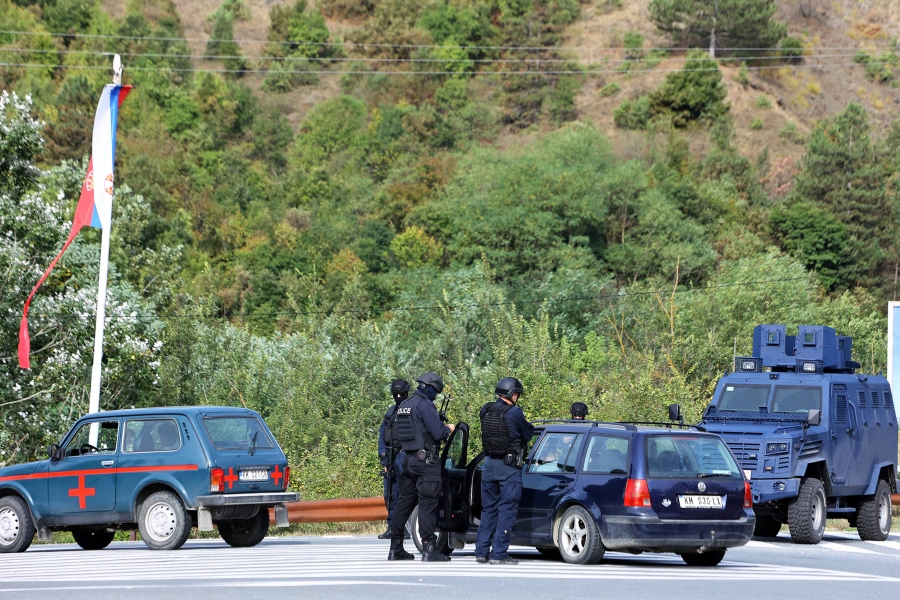Serbs living in the northern part of Kosovo expressed distrust in Pristina institutions, fear of the Serb List, a decline in trust in official Belgrade, as well as a high degree of trust in the Serbian Orthodox Church and KFOR, the findings of Demostat focus groups show.
The readiness of Kosovo Serbs to armed resistance to Pristina was detected, in order to protect personal security, “in order to defend their lives and homes”.

Serbs living in the northern part of Kosovo expressed distrust in Pristina institutions, fear of the Serb List, a decline in trust in official Belgrade, as well as a high degree of trust in the Serbian Orthodox Church and KFOR, the findings of Demostat focus groups show.
The readiness of Kosovo Serbs to armed resistance to Pristina was detected, in order to protect personal security, “in order to defend their lives and homes”.

The presence of various types of fear - fear of uncertainty, fear of Pristinas repression, fear of the Kosovo security forces, fear of the outbreak of armed conflict, including war, is the main finding of Demostats focus groups that we organised after the event in Banjska on September 24th, a police officer of Albanian nationality and three young Serbs were killed. Our main goal was to explore the social hopes and fears among Serbs living in the north of Kosovo and Metohija.
Fear in people is what was first noticed, because many did not want to participate in Demostats focus groups, so we faced a big problem of finding participants for public opinion polls. In addition to the above findings, we detected the fact that a certain number of people are afraid of representatives of the Serbian List, which was one of the reasons why we were difficult to find interlocutors.
Along with the fears among the respondents, Demostat also noticed distrust. The high degree of distrust refers primarily to the institutions of Pristina, mostly the government led by Albin Kurti, as well as to the illegitimate local administrations that were elected after illegitimate elections in the north of Kosovo and Metohija (in these elections, let us remind you, Serbs did not participate because Pristina persistently refuses to form the Association of Serb Municipalities, which is still an obligation from the Brussels Agreement, signed in 2013.). There is also a high level of distrust in the Kosovo police service (KPS). At the same time, we detected the trend of decreasing level of trust in the institutions of Serbia (in the official Belgrade), after the Serbs from the northern part of Kosovo and Metohija left local institutions, and this “erosion of trust” was especially intensified after the tragic events in Banjska.
On the other hand, when it comes to trust, our focus groups have shown that the Serbian community in Kosovo trusts KFOR the most, which we have recently published (https://demostat.rs/sr/vesti/ekskluziva/srbi-sa-severa-kosova-najvise-veruju-kfor-u/1876 as explained by the respondents, it is believed that this mission can provide security and security, which primarily refers to protection from Pristinas repression. Also, Serbs in Kosovo have great confidence in the Diocese of Raska-Prizren.
Demostat, through the research conducted at the level of central Serbia, found that there was no will of citizens to participate “in the war for Kosovo”. For instance, we have recently investigated which problems citizens perceive as the greatest when it comes to them personally, and we have detected that these are issues related to personal standard of living, while Kosovo is perceived by many respondents as the biggest problem of the state of Serbia.
However, among the Serbs living in the north of Kosovo and Metohija, we found a high readiness for armed resistance to Pristina, in order to protect personal security, “in order to defend their lives and homes”, which is noticeable not only among younger people, but also among older Serbs living in the area. It can be explained by the following facts:
Discussions were conducted within two focus groups, with nine participants each. This was done after the events in Banjska that took place on September 24th this year, i.e. after the first open armed conflict between Serbs and Albanians in Kosovo since the organised violence against Serbs in March 2004. On September 24th three Serbs and one Kosovo police officer were killed.
In all societies there are issues that are rather being skipped. Certain...
The neoliberal path, started in 2001, has led to especially bad results in Serbi...
For centuries, the region was subsumed within the Ottoman and Hungarian Empires,...
"Serbia has returned to the systemic and anti-systemic position of the political...
In reality, Serbia is closer than ever to NATO. In the course of the last five y...